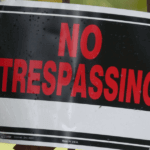 What is Considered Criminal Trespassing?
What is Considered Criminal Trespassing?
Criminal trespassing can, at its simplest, be defined as being on someone else’s property while knowing that you do not have permission to be there. It may not seem like a major offense, but it can be serious in the eyes of Illinois law.
Depending on the circumstances, trespassers could be charged with a misdemeanor or even a felony, and other crimes like vandalism could be tacked on. This is why state residents should understand the different laws regarding the different kinds of trespassing.
Anyone wishing to learn more about trespassing laws in Illinois can reach out to the criminal defense attorneys at Mitchell S. Sexner & Associates LLC. Call our experienced Chicago lawyers at (312) 644-0444 to receive a free consultation today.
Criminal Trespass to Real Property
Also known as criminal trespass to land, this offense is usually a Class B misdemeanor. However, it is a Class A misdemeanor when someone enters land “used or capable of being used for growing crops,” or if they drive through an orchard in a motor vehicle.
According to Illinois Statutes 5/21-3, you need permission to be on someone else’s property. If you enter a building without it, enter someone else’s property despite receiving notice that such entry is forbidden, or refuse to leave when someone demands it, the courts would consider it trespassing. One cannot legally obtain permission from the owner by falsely identifying themselves and deceiving them.
Illinois law considers signs that read “No Trespassing” as sufficient notice that entry is forbidden. People can also mark trees and posts on your property with purple splotches of a certain length and height under the “Purple Paint Law.”
Of course, one can be excepted from this law if you enter a building that is marked as open to the public. Even if it is not open at the time, one can still be excepted if you reasonably believed that it was open.
Exceptions are also granted to people who have permission from the owner to stay on their land, including migrant workers; enter another person’s property “for emergency purposes,” such as escaping imminent danger; and enter “unoccupied and abandoned residential properties” to beautify them, as long as said properties have been abandoned for one year and taxes have not been paid in two years.
Criminal Trespass to State or Government Property
Statutes 5/21-5 describes criminal trespass to “State-supported land,” a term defined as “land supported in whole or in part with State funds, or federal funds administered or granted through State agencies.” This can include government buildings and the grounds around those buildings, parks, schools, and playgrounds.
As with criminal trespass to real property, someone who enters or stays on state-supported land without receiving permission for either is violating this law, and they can face a Class A misdemeanor. This specifically applies to people who “are interfering with another’s lawful use or enjoyment of the property,” which means disrupting activities being conducted on this land and blocking public access.
Certain locations also have their own laws. Statutes 5/21-7 applies to trespassing in restricted sections of airports. This is a Class 4 felony, though it escalates to Class 3 if one enters without permission while possessing a weapon, a replica of one, or ammunition. Unauthorized and otherwise unlawful entry to a nuclear facility, as stated in Statutes 5/21-8, is a Class 4 felony.
Furthermore, according to Statute 5/21-9, criminal trespass to a “place of public amusement” - any facility where entertainment activities take place, such as a stadium or a theater - is a Class 4 felony, and it comes with a fine of at least $1,000 as well as potential probation and community service.
Other Kinds of Trespassing
What constitutes trespassing on a residence is somewhat different from what constitutes trespassing on real property. In accordance with Statutes 5/19-4, you would be charged with this offense if you enter or remain inside someone’s home, or dwell without their permission after being told to leave. Illinois law considers criminal trespass to a residence a Class A misdemeanor, as well as a Class 4 felony if the accused was aware that there were other people inside.
There is also criminal trespass to vehicles, Statutes 5/21-2. This offense is simply applying the established definitions of criminal trespass to motor vehicles, though Illinois also includes aircraft, watercraft, and snowmobiles under the definition of “vehicles.” If one enters or operates any of these without the owner’s permission, it’s a Class A misdemeanor.
Contact Experienced Criminal Defense Attorneys
Even though criminal trespass laws largely come down to being on someone’s property without their consent, there are many laws that focus on specific locations or conditions, as well as a number of exceptions. At Mitchell S. Sexner & Associates LLC, our attorneys are versed in all of these and more.
If you ever seek assistance in understanding these laws or someone to represent you in a case involving these laws, you can call us any time at (312) 644-0444. Reach out and receive a free consultation today.


 What is Considered Criminal Trespassing?
What is Considered Criminal Trespassing?